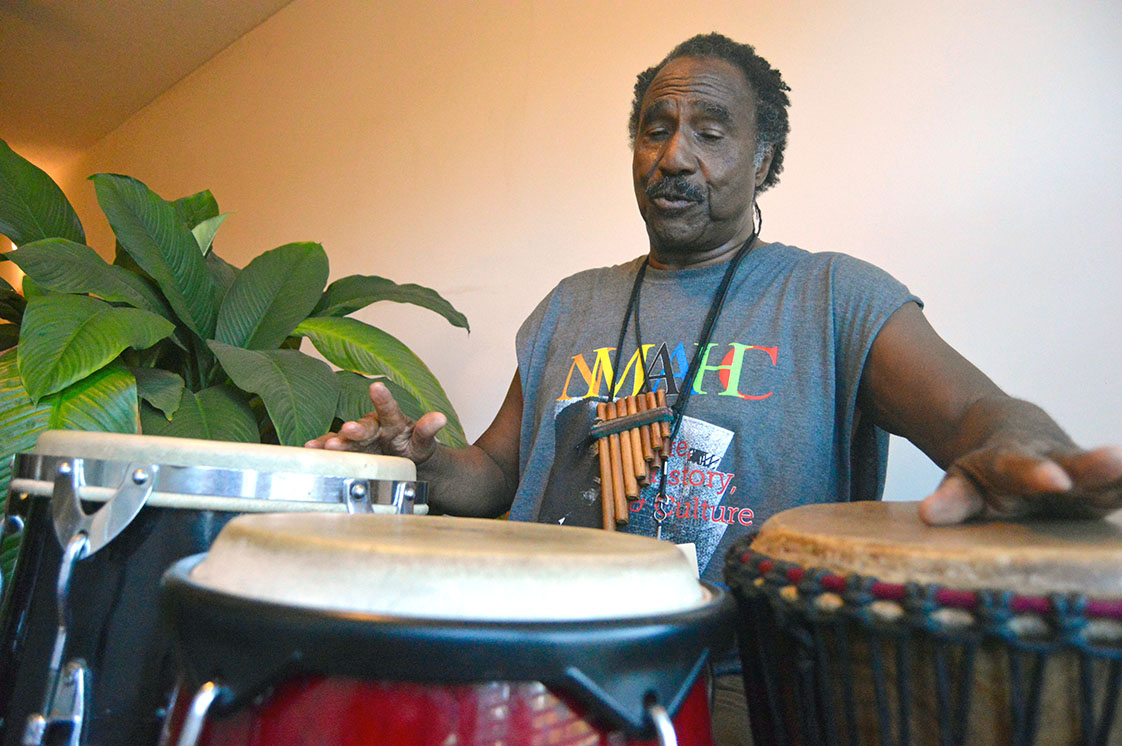
Ken Moshesh, 70, began drumming on oatmeal containers as a child and now has developed his own percussive style that builds on pre-colonial African and Latin traditions and geometric shapes, similar to constellations. He call his drumming system "Ameri-cosmic." (Staff photo by Meredith Wilson)
Ken Moshesh is full of stories — stories he’ll tell you over drums.

Ken Moshesh, 70, who began beating on oatmeal containers as a child, now has developed his own percussive style that builds on pre-colonial African and Latin traditions and geometric shapes, similar to constellations. He calls his drumming system “Ameri-cosmic.” (Staff photo by Meredith Wilson)
He organized communities with the Black Panthers, taught at the University of California at Berkeley, toured with experimental jazz composer and bandleader Sun Ra, and the fell into a series of circumstances, including skyrocketing real estate prices in the Bay Area, that made him homeless from the ’90s through the 2000s before moving to Durham in 2009.
Moshesh, 70, grew up the oldest of 11 children in a poor neighborhood in Oakland, Calif., and started drumming on empty cardboard Quaker Oatmeal containers.
“All I knew was that I wanted to take these boxes, turn ’em over and play ’em,” he said. “A lot of things happened where I couldn’t continue other instruments…but somehow, it was always back to doing this.”
He played in the drum circles at UC-Berkeley before developing his unique, multi-drum playing style and writing lyrics based on his life. Though he didn’t always have his drums — or a roof over his head — he kept the rhythm going.
“The good thing about this instrument, and that’s probably why I was blessed with it, is that you can play it on your legs, you can play it on the table, you can play it and just continue, continue, continue, until you can get to your drums again,” he said. “That’s the one thing that’s always continued.”
He calls his style the “Ameri-cosmic drumming system.” He moves his hands over his five — sometimes more — conga drums, forming shapes and angles like constellations. His work is jazz-influenced and builds on pre-colonial African and Latin drumming styles.
He came to Durham in 2009 to be close to his daughter, a doctor at Duke University Hospital, and two pre-teen granddaughters, though he said he didn’t want to be a burden to them.
“All of the activist things that were done were so that [my family] could be as much as they could,” he said.
Now, he has an apartment he found through the Durham Housing Authority. In the corner by the window sit two large, leafy green plants and his five conga drums. Several smaller drums and a pan flute sit on the table in the living room, and one of his granddaughter’s paintings hangs on the wall.
He plays with D-Town Brass, a 15-person psychedelic jazz-funk group and has released four solo albums since moving to Durham. He’ll release another in spring 2017.
He’s worked with the Community Empowerment Fund (CEF), a nonprofit that pairs individuals with longtime volunteers called advocates to help them work toward financial freedom, on developing his business and online presence as a musician.
“This is a lifesaver,” Moshesh said of CEF. “I would have given up on getting this far.”
His music is available on iTunes and Bandcamp, and he’s gradually releasing his autobiography, “Cobblestoning Quicksand Mazes” on his website. The book, published in print in 1999, describes his experiences living on the streets and how society can progress to give people stable footing.
“Every positive step [activists] made in any area was part of creating a perilous path to transverse the quicksand…of homelessness in modern America,” Moshesh said.
His CEF advocate, Eliza Letourneau, said working with him has been fun, though Moshesh laughed and said she probably thinks he’s crazy.
“You always know what you want to get done, that’s for sure,” Letourneau replied with a laugh.
D-Town Brass keyboardist and founder Andy Magowan recalls meeting Moshesh while loading equipment in the parking lot of the Golden Belt arts center in July 2012. Magowan said he couldn’t believe that Moshesh had toured with Sun Ra, one of the band’s main influences.
“It was just an amazing coincidence, as if the universe put him there,” Magowan said. “He’s been a really great addition to the band.”
No one else drums like Moshesh, Magowan said.
“Not at that level of understanding and freedom that he has,” he said. “He brings a mastery but also just a totally surprising element.”
Though Moshesh is no longer involved with activism on the streets, he said he hopes to inspire people through his music and story.
“You’re in a better position to effect some positive change once you’ve gone through it and see what is possible,” he said. “My music — the lyrics, the sounds and the fact that I, an ex-homeless person, was able to come back and achieve all of these things…all of that continues.”